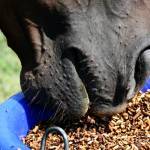Aim for Optimal Protein in Horse Diets

Optimal protein in a horse’s diet helps build muscle, thereby supporting athleticism. Horsemen should not, however, offer an overabundance of protein in a horse’s diet with the attitude of “if some is good, more is better.”
According to a recent review published by researchers from the University of Kentucky*, optimal provision of nutrients, particularly protein, should be the goal when feeding horses.
“Adequate protein levels must be provided to meet the body’s needs without overloading the system with nitrogen,” said Kathleen Crandell, Ph.D., a Kentucky Equine Research nutritionist. “Excess protein can make the kidneys work harder due to elevated urinary excretion of urea, a byproduct of protein digestion.”
Other detriments to excess dietary protein include:
- Environmental contamination and eutrophication, a process in which a body of water becomes enriched due to dissolved nutrients, including nitrogen, that stimulate the growth of plants and algae;
- Production of excess ammonia emissions that negatively affect air quality; and
- Economic losses, as protein is an expensive component of feeds.
“Unfortunately, the amount of individual amino acids—the building blocks of proteins—that horses need each day have not been completely elucidated. This includes levels of essential amino acids, such as lysine and threonine,” Crandell explained.
Further research into exact amino acid requirements “would enable the industry to achieve greater productivity by economic and well-balanced feed formulation,” concluded the University of Kentucky researchers.
Quality forage should provide adequate levels of all amino acids to support a horse’s needs. If quality forage or pasture is unavailable, a low-intake ration balancer such as All-Phase, may help fill dietary amino acid needs. Ration balancers like All-Phase are high in protein and formulated to be fed at low levels while still providing adequate amino acid levels.
*Mok, C.H., and K.L. Urschel. 2020. Amino acid requirements in horses: A review. Asian-Australasian Journal of Animal Science 33(5)679-695.








